| 1985 |
18 March: Death of
Roger Sessions at his home in Princeton., N.J.
Spring: First
meetings, in Berlin, with Arvo Pärt. Later in Budapest, for
discussions with Boosey & Hawkes's Hungarian partners. Introduced to the
composer György Kurtág. Private and informal meeting with
Alfred Schlee.
17-19 April: In
Duisburg for premiere at the Deutsche Oper am Rhein of Alexander Goehr's
opera Behold the Sun (Die Widertäufer).
September: First visit
to Warsaw since the end of martial law (imposed in 1981). Post-concert
discussions in the crowded bar of the Europejski Hotel are seldom as indiscreet
as the one between a native German-speaker and a German-speaking Pole to which
D is witness. The Pole remarks that he had been forced to learn German at
school during the Nazi occupation, and Russian in similar circumstances after
1945. Without lowering his voice, he expresses his opinion that Solidarity had
scored moral and political victories from which - despite all appearances to
the contrary - the Soviet Union and Communism would never recover. Towards the
end of the discussion, D is given to understand that this Polish musician - a
formidable figure - is the composer Henryk Mikolaj Górecki.
Honoured by many of his colleagues and students in Poland, but quite unknown to
the general public abroad and long excluded from avant garde circles in Western
Europe, where he had once enjoyed high favour, Górecki had been under
close police surveillance during the Martial Law period. D returns to England
with a parcel of Górecki scores provided by his Polish publisher, and a
recording of the Third Symphony. Months will pass before he dares examine the
scores (which at first glance seem to confirm the diagnosis of a well-known
Polish colleague who maintains that his former idol has seemingly taken leave
of his senses). Meanwhile film-goers in France and elsewhere are said to be
reacting immoderately to the fragment of Górecki's Third Symphony with
which Maurice Pialat closes Police, a thriller set in Marseilles.
At a social gathering in West
Berlin on the return leg of his Warsaw trip, D meets an economist from a
non-governmental organisation based in Berlin. Charged with monitoring at every
level the economies of the Eastern 'bloc' countries, his unit has already
concluded that the Soviet 'empire' is in effect bankrupt and will soon
collapse.
October: Third visit
to the Mürz Valley, again with Goldschmidt, whose setting of
Heine's Belsatzar for unaccompanied mixed chorus has been commissioned
by the Buchebner Society and is first performed in a baroque church. Another
guest of the Werkstatt is Wolfgang von Schweinitz. Schweinitz and Drew
leave Mürzzuschlag by car and head for the Bavarian border. On the way
they stop in Mittersill and search in vain for the Webern house.
Publications: Introduction
to Ernst Bloch and his Essays on the Philosophy of Music published
by Cambridge University Press.
|
| 1986 |
March: In Baden-Baden
for Boulez 60th birthday concert, and major Jean Cocteau
exhibition.
Spring/early summer:
Visits Schweinitz at his home in Lower Saxony for discussions regarding
the translation of the poems by Sarah Kirsch he had set in his Lieder cycle
Papiersterne. In West Berlin, recommends Goldschmidt to the
Berliner Festwochen and specifically to Elmar Weingarten, in connection
with their plans to feature, at the next festival, music by composers driven
from Hitler's Germany.
The Górecki
scores and tapes brought back from Warsaw six months before have now been
examined by D, and forwarded to Tony Fell via Paul Meecham. It is
agreed that Boosey & Hawkes will approach Górecki and his
Polish publishers with a view to representing his music in Western
Europe.
Spring: [?] to Moscow
for the annual session of the music-publishing organisation responsible for
overseeing the representation in Western countries of all music whose
copyrights are assigned to the Soviet state publishing house. Attends, from a
standing position conveniently close to the exit, the annual assembly of the
Soviet Union of Composers in the Kremlin; there is not a seat to be had in the
great hall. To the assembled throng of Soviet composers, the newly appointed
Gorbachev delivers an opening address. Not present are the dissident composers
D will meet during his stay - Edison Denisov (an acquaintance from
before), Elena Firsova, Dmitri Smirnov, Alexander Knaifel,
Peteris Vasks, and, on the last day, Felipp Herschkowitz, the former
pupil of Webern and the key figure in the Soviet musical
'underground'
5-6 July: First
discussions with the University and Cantonal Library in Lausanne regarding the
establishment of a Markevitch Archive, complementary to the one at the
French National Library in Paris.
October: D returns to
the Warsaw Autumn Festival and continues discussions regarding
Panufnik's projected return to Poland as the Festival's guest of honour.
Official contacts with Górecki and his Polish publishers. From
now on, the need to maintain direct communications with Górecki
is pressing, and the difficulty of doing so considerable. Even after the
martial law period - in which, for a while, he had been under effective house
arrest - Górecki remains under surveillance. Phone calls are
certainly being monitored. Although his confiscated passport has now been
returned to him, he is reluctant to travel and in principle unwilling to visit
any Western country which requires a visa. Germany and Austria are for that
reason and also for language reasons the only countries he is willing - though
far from keen - to visit.
Autumn and winter:
Intensive work, during available weekends and holidays, on the typescript and
manuscript of the book which will be published by Faber & Faber in the UK
and the University of California Press in the USA under the title KURT
WEILL: A HANDBOOK. It is a greatly expanded version of the catalogue
commissioned by the West Berlin Academy of Arts in 1960 (!) .
Reflections on the Last
Years:Der Kuhhandel as a Key Work is published in A New Orpheus -
Essays on Kurt Weill, edited by Kim Kowalke.
|
| 1987 |
13 February: Submits
to the Bibliothèque Cantonale et Universitaire, Lausanne, a formal
proposal regarding the establishment of a Markevitch Archive that will
concentrate on Markevitch's composing career with a view to propagating
scholarly research. Simultaneously, D opens discussions with former associates
of Markevitch in Switzerland, France, and the Low Countries with the object of
establishing an informal Association that will help co-ordinate the scholarly
objectives of the Archive with active promotion of performance and recordings.
A consensus is soon reached, and on that basis a committee of 'friends' (Les
Amis du Compositeur Igor Markevitch) is formed, and sponsorship of its aims is
sought form leading musicians in Europe, the USA, and the Far East. Rolf
Liebermann agrees to be president of the Honorary Committee.
Spring: A working week
with Górecki, including a visit to the State Music Publishers in
Cracow, but mostly at Górecki's home in Katowice. A centre for coal
mining, heavy industry, and chemical plants, Katowice has the reputation of
being one of the most heavily polluted cities in Europe. Towards the end of his
stay, Górecki arranges an expedition to the countryside north of the
Tatra Mountains and close to Zakopane, the birthplace of one of
Górecki's musical idols, the composer Szymanowski. The first goal is the
Górecki family's summer resort - a wooden chalet in the village of
Chocholow. Nearby is Górecki's Polish Eden - open meadows and a
crystal-clear river which descends from the Tatra Mountains looming
above.
Górecki and D proceed
from Chocholow to Zakopane. From there they begin the two-hour road journey
back to Katowice via several pleasant towns and villages. Not far from Katowice
Górecki sees a road sign to Oswiécim, and quietly asks whether
they should make a short detour to the site of the former Nazi death-camp -
Auschwitz-Birkenau.
They reach the site shortly
before closing time. After the long walk to the Memorial at the far end, they
pause, and for many minutes scrutinise the names inscribed there. When at last
they turn and begin to walk back, there is no-one to be seen, and the gates
appear to be closed. The light is going. In silence, they hasten back,
following the line of the original railway track.

June-July: The Seventh
International Festival of Music at the Almeida Theatre in London - director
Pierre Audi - is dedicated to Austrian music D joins Yvar Mikhashov as
consultant for the series. The featured composers are Cerha,
Gruber, Krenek, Schwertsik, and Eisler. A double
issue of Tempo (161/162, June/September) is subtitled 'An Austrian
Quodlibet'. D contributes Eisler and Austrian Music
18 September: Simon
Rattle opens his Berliner Festwochen programme at the Philharmonie with the
German premiere of Goldschmidt's Ciaccona Sinfonica (1935). The
work and its composer win a standing ovation. From now on, Goldschmidt is
'news' in Germany.
mid-September: D is in
New York for the launch on the 19th of KURT WEILL: A HANDBOOK.
Following its publication in the UK a month or so later, BBC Radio 3 broadcast
excerpts from the book every day for a whole week, several times a day. By such
means - thanks to unknown benefactors among the Radio 3 production staff - a
book that had begun as a mere catalogue acquires wings, takes flight, and
reaches a radio audience numbered in hundreds of thousands. Meanwhile the
Academy of Arts in West Berlin have taken no notice of the publication and
reception of the book in the UK and the USA. Nele Hertling, the
project's loyal supporter, has recently resigned as Secretary of the Academy,
and her successor will soon decline to publish or to promote the German
translation which Hertling had commissioned from Ken W.Bartlett (and
which he in turn had undertaken in scrupulous consultation with the author and
with selfless disregard for his own interests).
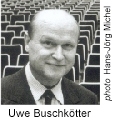 November: Uwe Buschkötter, owner of Largo
Records in Cologne, telephones D and invites him to plan a CD of previously
un-recorded Kurt Weill pieces for release in 1990 to mark the 90th
anniversary of Weill's birth and the 40th of his death. They meet for the first
time a month later. It is the start of a 10-year collaboration. November: Uwe Buschkötter, owner of Largo
Records in Cologne, telephones D and invites him to plan a CD of previously
un-recorded Kurt Weill pieces for release in 1990 to mark the 90th
anniversary of Weill's birth and the 40th of his death. They meet for the first
time a month later. It is the start of a 10-year collaboration.
30 December: David
Atherton conducts the BBC Symphony Orchestra in a radio recording of
Górecki's Third Symphony with Margaret Field as soloist.
|
|
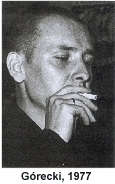
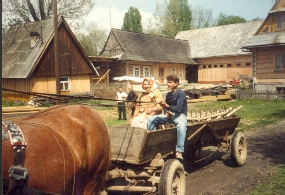
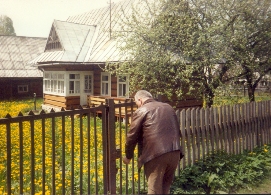
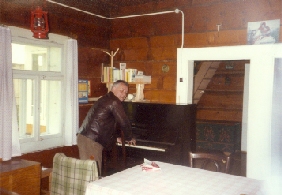
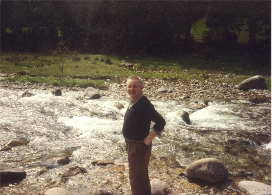

 November: Uwe Buschkötter, owner of Largo
Records in Cologne, telephones D and invites him to plan a CD of previously
un-recorded Kurt Weill pieces for release in 1990 to mark the 90th
anniversary of Weill's birth and the 40th of his death. They meet for the first
time a month later. It is the start of a 10-year collaboration.
November: Uwe Buschkötter, owner of Largo
Records in Cologne, telephones D and invites him to plan a CD of previously
un-recorded Kurt Weill pieces for release in 1990 to mark the 90th
anniversary of Weill's birth and the 40th of his death. They meet for the first
time a month later. It is the start of a 10-year collaboration.